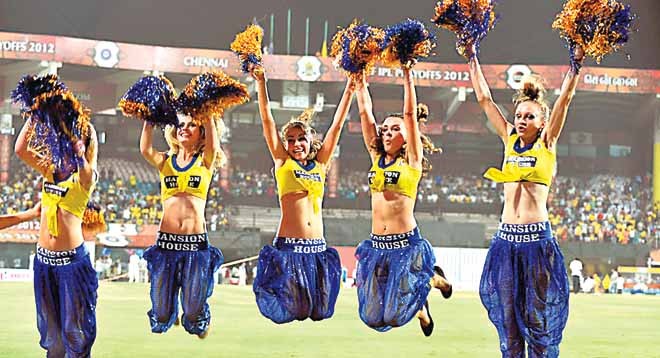

The first phase of Indian Premier League (IPL)-7 has begun in the United Arab Emirates and will continue till April 30 at three venues: Dubai, Abu Dhabi and Sharjah.
The later part will be played in India and the final will be held on June 1, 2014, at Wankhede Stadium, Mumbai.
Sachin Tendulkar’s Mumbai Indians are the defending champions who won IPL-6 by beating Chennai Super King by 23 runs in the final.
Despite the PCB’s support to the BCCI at every forum, Pakistan’s players remain deprived of the chance to show their talent in the IPL.
That has been BCCI’s policy since the first IPL in 2008, in which 11 Pakistani cricketers played for different franchise.
In 2010, despite being included in the IPL auction, no Pakistani player was hired.
Interestingly, former Pakistan captain Wasim Akram was named the coach of Shahrukh Khan’s Kolkata Knight Riders (KKR).
Notwithstanding the glamour, money and a lot of cricket, IPL has been hit by several controversies since its launch in 2008.
Before the beginning of the 7th edition, the Indian Supreme Court removed BCCI President N Srinivasan for alleged corruption in IPL.
Srinivasan appealed against the verdict but the Supreme Court turned down his request for reinstatement.
In the sixth edition last year, Indian pacer Sreesanth, Ajit Chandila and Ankeet Chavan were arrested for spot-fixing in IPL matches for payments of upto Rs6 million for giving away a certain number of runs in an over.
BCCI suspended the three players from the IPL and referred the matter to its Disciplinary Committee for further action to cool down the issue.
But the question is: what did the International Cricket Council (ICC) do; it didn’t take up the matter as seriously as it should have.
The international cricket body was very vigorous in taking action against Pakistan’s Mohammad Amir, Mohammad Asif and Salman Butt when they were found guilty of spot-fixing in England in 2010.
But this time, the ICC not only avoided taking any immediate action but instead backed the Indian board, assuring it of "full support", and welcomed the steps announced by BCCI to deal with the spot-fixing issue.
Pakistani umpire Asad Rauf became another victim of ICC’s bias when he was stopped from officiating in the Champions Trophy in England following media reports that indicated he was under investigation by Mumbai Police.
Before confirmation of Asad Rauf’s involvement in the spot-fixing the ICC pulled his name from the Champions Trophy on the basis of Indian media’s reports.
The ICC did not mention what the Mumbai Police were reportedly investigating Rauf for, and said it had no further comment to make.
It was not the first case in IPL. The IPL-5 remained in the headlines more due to off-the-ground activities than on-field performances.
In the fifth season, five Indian domestic players were suspended for spot-fixing. Two IPL players, an actress and around 100 other persons were also arrested at a hotel for using drugs.
First, a TV channel caught five players -- Shalabh Srivatava, TP Sudhindra, Abhinav Bali, Mohnish Mishra, Amit Yadav -- taking bribes for spot-fixing.
BCCI only suspended the involved players and formed an inquiry committee, but no more action was taken.
Australian cricketer Luke Pomersbach was arrested in New Delhi after he sexually assaulted a US woman and then beat her fiancé who tried to save her.
Luke made his IPL debut for Kings XI Punjab. But in 2011, he was bought by the Royal Challengers Bangalore for $50,000.
The most prominent incident of the IPL 2012 was the one that involved Bollywood star and co-owner of Kolkata Knight Riders Shah Rukh Khan. He was banned from entering the Wankhede Stadium, Mumbai, for five years after a scuffle with the stadium’s security staff.
The local authorities alleged that the star was drunk, but SRK denied the charge. The SRK issue became political as Indian West Bengal CM Mamata Banerjee appealed for reconsideration of the decision. SRK is the brand ambassador of her state. SRK again made headlines when he was summoned by the Rajasthan police over a complaint of smoking in public during a match on April 8, 2012, in Jaipur.
Another controversy appeared when former Indian cricketer Kirti Azad sat on a hunger strike with several other people against the way the IPL was being managed -- without any transparency and accountability.
On April 25, 2010, BCCI suspended Lalit Modi, the IPL chairman, who conceived the idea of this tournament and made it a huge success, for alleged misappropriation of funds.
A case was filed against him and he was officially banned from participating in the affairs of the Board, the IPL and any other committee of the BCCI.
In September 2011, BCCI’s governing body announced that the IPL franchise Kochi Tuskers Kerala was terminated due to the failure to submit its yearly bank guarantee of Rs156 crores. Ravindra Jadeja was the biggest buy of 2012 season with $2 million. But he was banned from playing in the IPL 2010 for trying to negotiate a contract with another franchise and in turn delaying the signing of his contract with Rajasthan Royals.